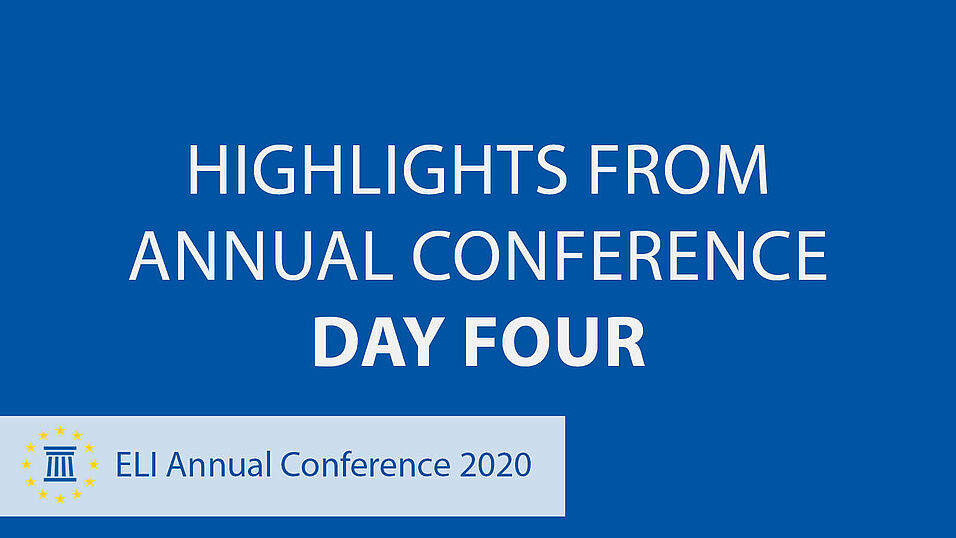The Business and Human Rights: Access to Justice and Effective Remedies project was the first topic discussed on the day. Project Reporter Jonas Grimheden was joined by four experts, Catherine Kessedjian, Robert McCorquodale, Ilaria Pretelli and Lise Smit, who discussed the issue of human rights due diligence and the implications of private international law rules on access to remedies. This was followed by a lively Q&A session, in which, among other things, issues of availability of remedies, court jurisdiction and possible next steps for the EU were discussed.
The next webinar focused on the topical issue of the Independence of Judiciary and ELI cooperation with Mount Scoups Group in this area. ELI was pleased to welcome Giuseppe Ferrari, Thorsten Ingo Schmidt, Daniela Piana and Shimon Shetreet who joined Executive Committee Members Lord John Thomas and Fryderyk Zoll. After a presentation of Mount Scopus International Standards of Judicial Independence, aspects such as the importance of education in promoting judicial independence and the rule of law, the role of councils of the judiciary as well as challenges resulting from the use of AI on the independence of judiciary were discussed. This was followed by a lively debate with attendees, which centered on the dissemination of the Mount Scopus Standards and measures to ensure these principles are observed.
The following four sessions focused on recent ELI feasibility studies. Feasibility studies are precursory reports which examine whether a particular issue has the potential to be the subject of a fully-fledged ELI Project. The opportunity that the Annual Conference provides for the proposers to present and discuss their findings with external experts and ELI Members is vital in determining the next steps.
The first feasibility study presented was on Fundamental Constitutional Principles, a Study which seeks to outline the basic principles which form the foundations of a European liberal democratic State. One of the study's authors, Takis Tridimas, was joined by Laurent Pech, Silvana Sciarra, Krysztof Wojtyczek and Alison Young to form a diverse group of experts representing both academia and practice as well as a variety of European national perspectives. During the discussion, participants provided feedback on the study, pointing out its timely manner, and referred to complementing work done by other organisations, among other things.
A webinar on the Concept and Role of the Courts in Family and Succession Matters was next on the agenda. This time three of the feasibility study authors, Elena Bargelli, Anatol Dutta and François Trémosa, were joined by Matthias Neumayr for a discussion which centered on the issue of out-of-court proceedings in family and succession matters, that have arisen in European jurisdictions in the past years (so called ‘dejurisdictionalisation’). In the Q&A, the project’s methodology and concerns regarding the loss of precedents/development of the law were among topics addressed.
The session on EU Conflict of Laws for Companies was chaired by Georg Kodek, and also welcomed Jessica Schmidt, Luca Enriques and project proposer, Chris Thomale, the author of the ELI feasibility study. After an introduction to the topic, the discussion progressed to the need for harmonisation of conflict of law for companies, a potential Rome V regulation and the role of arbitration as an alternative method of addressing the problems resulting from the lack of harmonisation.
The afternoon ended with a webinar on Corporate Sustainability, Financial Accounting and Share Capital at which all the authors of the feasibility study, Yuri Biondi, Corrado Malberti and Colin Haslam, were present to discuss their work. Valuable further input was provided by Maria di Sarli and Vera Palea, who presented the Italian case study on company law regulations concerned with company capital requirements and the issue of corporate sustainability in EU accounting law and regulation, and Jean-Philippe Robé, who provided comments on the ELI feasibility study and the role of financial accounting in corporate sustainability in general.
The evening of 11 September saw the final event of the ELI 2020 Annual Conference, where the book 'Coronavirus and the Law', a collection of 60 essays on this most pertinent of topics, was presented. The ELI is proud that the entire team of editors, Ewoud Hondius, Marta Santos Silva, Andrea Nicolussi, Pablo Salvador Coderch, Christiane Wendehorst and Fryderyk Zoll were able to participate in the session, which included a live Q&A with ELI members.
It was certainly a fitting way to end this year's conference, which, like so many other events, needed to be re-imagined in light of the circumstances brought about by coronavirus. Alongside the ELI's own publication, its 'Principles for the COVID-19 Crisis', this book, edited by several leading ELI members, reflects the Institute’s desire to add a useful voice to the discussions on how the legal system, as indeed all areas of our society, can best function during and after this pandemic.

